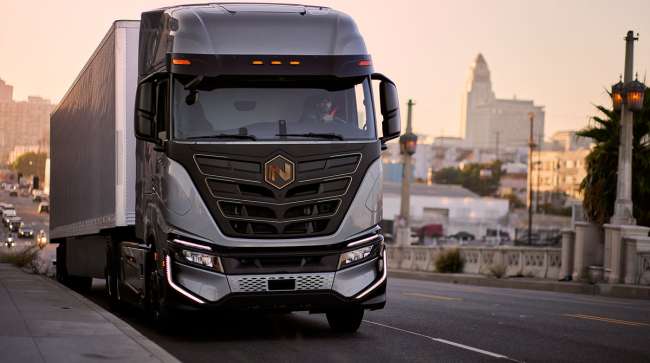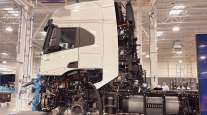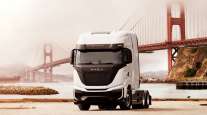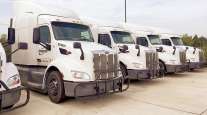Staff Reporter
Nikola Q4 Loss Dives 30.8% as R&D Costs Fall

[Stay on top of transportation news: Get TTNews in your inbox.]
Losses at Class 8 vehicle manufacturer Nikola Corp. narrowed 30.8% year-over-year in the fourth quarter of 2023 as research and development costs plummeted and a charge on discontinued operations was not replicated.
Nikola posted a loss of $153.6 million, or 14 cents per diluted share, compared with a loss of $222.1 million, 26 cents, in the year-ago period, it said Feb. 22.
The company’s research and development costs totaled $39.9 million in the most recent quarter, compared with $66.1 million a year earlier.
Nikola did not take a loss from discontinued operations in Q4 after taking a $46.1 million hit in the same quarter in 2022.
The company’s revenue more than doubled to $11.5 million in the most recent three months from $5.5 million in the same period in 2022.
However, Nikola only manufactured 42 trucks in Q4, less than a third of 133 trucks produced in the year-ago period.
As a result of the output level, each truck had a cash cost of $804,000 in Q4, Corporate Controller Brian De Hoog said during the company’s quarterly earnings call Feb. 22.
Nikola’s cause was not helped during the quarter by hydrogen fueling parts supply chain delays, CEO Steve Girsky added, noting during the question-and-answer session that the constraints were starting to be resolved.
Phoenix-based Nikola shipped 35 trucks in the most recent quarter, up 75% from 20 trucks in the same period a year earlier.
Nikola is only building hydrogen fuel cell electric trucks at present in Coolidge, Ariz., after halting manufacturing of battery-electric trucks in May.
COMTO's April Rai offers tips to increase workforce diversity and grow profits.. Tune in above or by going to RoadSigns.ttnews.com.
Serial production of the FCEV Tre semi began July 31.
Production and sales of battery-electric trucks is currently on hiatus as Nikola looks to repair, re-engineer and retrofit the vehicles’ batteries. The company issued a recall in August for all the BET tractors it had sold up to that point due to battery fires.
The company said Feb. 22 it remained on track to get the first recalled BETs back in customers’ hands by the end of March.
During the call, Girsky said Nikola intended to return all BETs to customers by late in the second quarter. The retrofitted trucks are undergoing testing.
Girsky said customers will receive “BEV 2.0,” which he promised would be lighter and have improved charging capabilities. “We are committed to the battery-electric platform,” he said.
While the company continues to lose money, a finance team now led on an interim basis by Girsky — after Chief Financial Officer Anastasiya Pasterick departed Dec. 1 — raised $230.3 million in funding in Q4, leaving the company’s year-end cash on hand at $464.7 million, the highest balance since Q4 2021.
Want more news? Listen to today's daily briefing above or go here for more info
The company is in talks with a potential new CFO, Girsky said during the call.
Nikola posted a loss of $996.3 million in 2023, compared with a $784.2 million loss in 2022.
Around $101.7 million of that was a loss on discontinued operations. Nikola began liquidating its Romeo Power subsidiary in July after paying $144 million for the battery manufacturer less than 12 months earlier.
Class 4-6 truck manufacturer Mullen Automotive on Sept. 11 bought Romeo’s battery production assets for $3.5 million.
The cost of producing trucks soared. Nikola’s manufacturing costs in 2023 jumped to $242.5 million from $132.6 million in 2022.
Nikola produced 138 trucks in 2023, compared with 258 a year earlier.
Looking forward, Nikola expects truck deliveries in a range of 400-450 semis this year, said De Hoog, adding that 100 would be BETs. He clarified that the BET delivery forecast did not include the recalled trucks.
The coming year would be all about optimizing revenues and costs as well as scaling the business, Girsky said.





